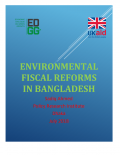
Bangladesh has made tremendous progress with development since independence reflected in rising income, sharp reduction in poverty and improvements with human development. Evidence, however, suggests that along with these positive outcomes there has been a substantial deterioration in the natural environment. Fortunately, there is now a growing recognition of the environmental damage of continuing with the business-as-usual development strategy and the risks it poses to the sustainability of development. In response, the government has adopted a large array of strategies, laws, rules and regulations, and adaptation and mitigation programmes and projects. But the results on the ground suggest that the implementation of these policies has been weak. Inadequate strategic thinking along with financial and institutional constraints has limited the implementation effectiveness of the government’s environmental protection strategy.
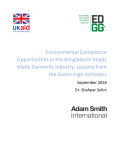
Bangladesh’s Ready-Made Garments (RMG) industry remains the backbone of its industrial growth in the coming decades. This paper sought to examine its environmental compliance landscape in terms of the incentives and barriers RMG entrepreneurs face. The paper in particular looked at the high achievers in greening, which includes some of the factories who have the most eco-friendly RMG factories, as certified by the US Green Building Council (USGBC); and some of the factories that partnered with the International Finance Corporation’s Partnership for Cleaner Textiles (PACT) project, which is the world’s largest initiative for resource efficient apparel manufacturing (Daily Star 2017 a). This approach was taken to demonstrate three things: is cost recovery possible in the medium to long term for investments that go beyond mandatory government and basic buyer requirements; what kind of barriers did the high achievers face and what lessons are there for other RMG companies who may benefit from greening; and what kind of policy and institutional changes are needed to spread greening from the high achievers to the rest of the industry. The key points of the paper are given below.
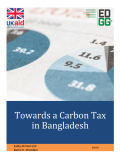
Bangladesh is a strong actor in the effort to reduce global carbon emission. This is appropriate as it faces a major adverse burden from global climate change. Although per capita carbon emission is low, total carbon emission in Bangladesh is growing. Consequently, as a good global team player, Bangladesh committed to reducing its carbon footprint in its Intended Nationally Determined Contributions (INDC) submissions in 2015.
The strategy for reducing carbon emission relies almost entirely on regulations, investments and technology. There is hardly any use of incentive policies. A recent paper showed the great potential for using incentives, especially fiscal policy, to improve environmental management in Bangladesh also mobilizing revenues while (Ahmed 2018). The paper notes that a balanced carbon emission reduction strategy will need to combine regulations with fiscal incentives to reduce air pollution and adopt clean energy. In that context, it advocates the use of a carbon tax as a fiscal policy instrument to curb the use of fossil fuel and thereby lower carbon emission.
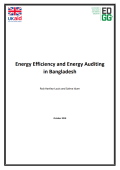
Bangladesh is at a critical stage in its development, being now listed as a middle-income country, and looking to reach upper-middle income status by 2021. Key to this change is the expanded growth of GDP from its stable 5-6% current growth, to a 7.5 – 8% level which is seen as being integral to the country’s continued progress. To reach the next level, Bangladesh will need to overcome a number of constraints to continue on its export-led growth path.
These are,
- insufficient supply of reliable energy,
- policies that indirectly stunt the development of economic activities unrelated to readymade garment exports, and
- insufficient security about property and land rights due in part to inadequate registry systems .
It is the first of these points that this paper is most interested in. The lack of a reliable electricity supply in Bangladesh has blighted economic development, and the impending shortage of natural gas compounds the difficulties in resolving this issue.
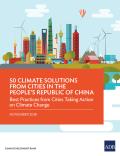
This publication showcases 50 innovative case studies from cities in the People’s Republic of China that are mitigating against and adapting to climate change. Solutions being implemented are proving that reducing carbon dioxide emissions and protecting the environment need not sacrifice economic prosperity and that they can also create valuable co-benefits in terms of positive impacts on public health and quality of life. The solutions cover a wide range of objectives, including reducing energy consumption, greening and cleaning energy supply, transforming the concept of waste, promoting green and blue spaces, and improving urban mobility.
